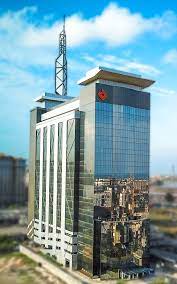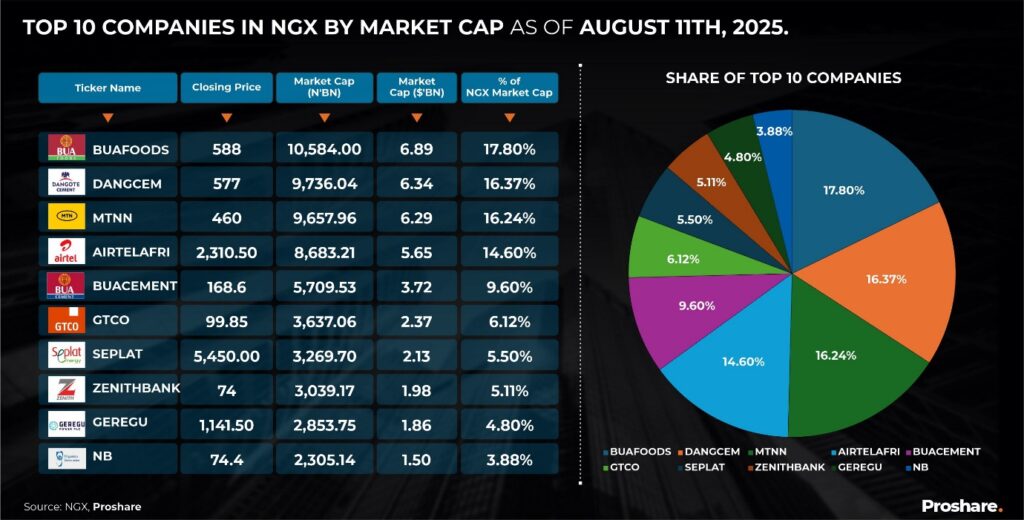Access Bank’s Muted Share Price Performance Raises Concerns .

Access Bank’s subdued share price performance, despite its dominant position in the industry with the largest resources and highest revenue generation, has raised concerns among investors and analysts. The disparity between the bank’s financial metrics and its market valuation has sparked questions about the factors driving this trend and whether the stock is undervalued. As peers exhibit stronger market performance, the scrutiny on Access Bank’s share price dynamics intensifies, warranting closer examination of the underlying causes and potential implications for investors.
ACCESSCORP closed its last trading day (Monday, August 18, 2025) at 27.50 NGN per share on the Nigerian Stock Exchange (NGX), recording a 1.6% drop from its previous closing price of 27.95 NGN. Access began the year with a share price of 23.85 NGN and has since gained 15.3% on that price valuation, ranking it 105th on the NGX in terms of year-to-date performance.
In contrast , the current share price of Guaranty Trust Holding (GTCO) is NGN 95.00. GTCO closed its last trading day (Monday, August 18, 2025) at 97.00 NGN per share on the Nigerian Stock Exchange (NGX), recording a 0.7% drop from its previous closing price of 97.70 NGN. Guaranty Trust Holding began the year with a share price of 57.00 NGN and has since gained 70.2% on that price valuation, ranking it 70th on the NGX in terms of year-to-date performance.
The current share price of Zenith Bank Plc (ZENITHBANK) is NGN 67.05. ZENITHBANK closed its last trading day (Monday, August 18, 2025) at 72.30 NGN per share on the Nigerian Stock Exchange (NGX), recording a 0.1% drop from its previous closing price of 72.40 NGN. Zenith began the year with a share price of 45.50 NGN and has since gained 58.9% on that price valuation, ranking it 79th on the NGX in terms of year-to-date performance.

The above figures of Access Holdings translate a miserable market value relative to its peers above . The market capitalization of Access Holdings Plc (ACCESSCORP) is approximately NGN 1.49 trillion; Guaranty Trust Holding is currently the sixth most valuable stock on the NGX with a market capitalization of NGN 3.53 trillion, which makes about 3.86% of the Nigerian Stock Exchange equity market while ZENITH BANK PLC has the market capitalization of 2.97 trillion.
Smart investors aren’t flying blind – key metrics are sending signals that guide their moves. Access Bank’s P/E ratio of 2.3x implies that investors are willing to pay ₦2.30 for every ₦1 of earnings. This relatively low P/E ratio might indicate that Access Holdings’ stock is undervalued .The bank’s P/B ratio of 0.4x suggests that the stock is trading below its book value. While this ratio is relatively low, it may indicate that investors are pricing in potential risks or challenges .
Relative to the above Access Holdings metrics , Guaranty Trust Holding Company (GTCO) presents a more intriguing investment opportunity, boasting a Price-to-Earnings (P/E) ratio of 3x. This is higher than the peer average of 2.5x just as its Price-to-Book (P/B) ratio of 0.82x too . Zenith Bank’s current price-to-earnings (P/E) ratio is 2.25, indicating that investors are willing to pay ₦2.25 for every ₦1 of earnings. This relatively low P/E ratio might suggest that the stock is undervalued, presenting a potential buying opportunity for investors.
The above lapses could be traced to its inability to exploit its size in assets and revenue for better profitability and value delivery to its investors .Access Holdings’ financial performance in 2024 reveals a striking disparity between its impressive gross earnings and relatively modest net income. With gross earnings of ₦4.9 trillion, the highest among its peers, one would expect a correspondingly high net income. However, Access Holdings reported a net income of ₦642.2 billion, reflecting a modest 3.7% increase from 2023. This pales in comparison to its peers, such as GTCO, which reported a net income of ₦1.02 trillion, and Zenith Bank, which saw a significant 52.6% year-over-year increase in profit after tax N1.03trn . UBA and First Holdco reported net incomes of ₦766.7 billion and ₦663.5 billion, respectively. The discrepancy between Access Holdings’ gross earnings and net income suggests that the company’s expenses, particularly interest expenses, which stood at ₦2.21 trillion, significantly impacted its bottom line
The net profit margin derived from from each of the above gross earnings and profit after tax showcases their strengths and competitiveness .A company’s net profit margin offers valuable insights into its financial health and operational efficiency. A high margin indicates effective cost management, pricing power, and financial stability, making it attractive to investors and providing resources for growth initiatives. Conversely, a low margin may signal inefficient operations, pricing pressure, or financial stress. By analyzing net profit margins, stakeholders can assess a company’s competitive position, identify areas for improvement, and make informed decisions. In the banking sector, for instance, GTCO’s 47.3% margin and Zenith Bank’s 25.93% margin reflect their strong market positions, while Access Holdings’ 13.2% margin may indicate opportunities for optimization and improvement.
The earnings per share (EPS) of GTCO and Zenith Bank reveal distinct and superior financial performances too relative to AccessHoldings. . GTCO’s EPS of ₦35.44 and Zenith Bank’s ₦32.87 indicate robust profitability, potentially driven by efficient operations and strategic investments. In contrast, Access Holdings’ EPS of ₦16.71 suggests relatively lower profitability. These EPS figures have implications for investors, as higher EPS values typically signify better returns on investment. GTCO and Zenith Bank’s strong EPS may attract investors seeking stable returns, while Access Holdings may need to optimize operations or explore growth opportunities to enhance shareholder value. The varying EPS figures underscore the importance of careful investment decisions and financial analysis in the banking sector
Access Holdings’ lower profitability can be attributed to several key factors. One major contributor is the bank’s high interest expense, which stood at ₦2.21 trillion – significantly higher than its peers, such as GTCO’s ₦283.2 billion and Zenith Bank’s ₦992.5 billion. This increased expense has undoubtedly put pressure on the bank’s bottom line. Additionally, Access Holdings’ cost structure is another area of concern, with the highest cost-to-income ratio among its peers at 58.3%, compared to GTCO’s 23.3% and Zenith Bank’s 33.3%. This suggests that the bank’s operational costs are not being efficiently managed, further impacting its profitability.
The problem with Access Holdings is that it prioritizes market capture share over as against profitability, aiming to become Africa’s most connected and influential banking group. The bank’s aggressive expansion into new markets, including acquisitions in Angola, Sierra Leone, and Tanzania, has resulted in significant costs and strain on profitability. This is reflected in its Return on Assets (ROA) and Return on Equity (ROE), which trailed its peers at 1.9% and 21.6%, respectively. While this strategy may yield long-term benefits, it’s clear that Access Holdings needs to balance its growth ambitions with prudent cost management to improve its profitability ¹.
Access Holdings, one of Nigeria’s largest financial institutions, has been grappling with a concerning trend: despite its significant asset size and impressive gross earnings growth, the company has struggled to generate commensurate value for its investors in the form of profit.
With a total asset value of ₦39.09 trillion and gross earnings growth of 88% year-on-year, Access Holdings would be expected to deliver robust profitability. However, the company’s profit after tax growth has been relatively modest, with a 14.7% increase in Q1 2025.
This disconnect between asset size, gross earnings, and profitability raises concerns about Access Holdings’ ability to efficiently utilize its resources and generate value for its investors. Several factors may be contributing to this issue, including cost pressures, operational inefficiencies, and strategic investments that may not be yielding the expected returns.
Compared to its peers, Access Holdings’ financial performance raises questions about its ability to generate value for investors. While the company’s asset size and gross earnings are impressive, its profitability lags behind some of its peers.
The key questions are: Can Access Holdings address its cost pressures and operational inefficiencies to improve profitability? Are the company’s strategic investments yielding the expected returns, or are they dragging down profitability? How will Access Holdings balance its growth ambitions with the need to generate value for its investors?
The value disconnect between Access Holdings’ asset size, gross earnings, and profitability is a concern that investors and analysts will be closely monitoring. As the company navigates the challenges of the financial sector, its ability to generate commensurate value for its investors will be crucial in determining its long-term success.




